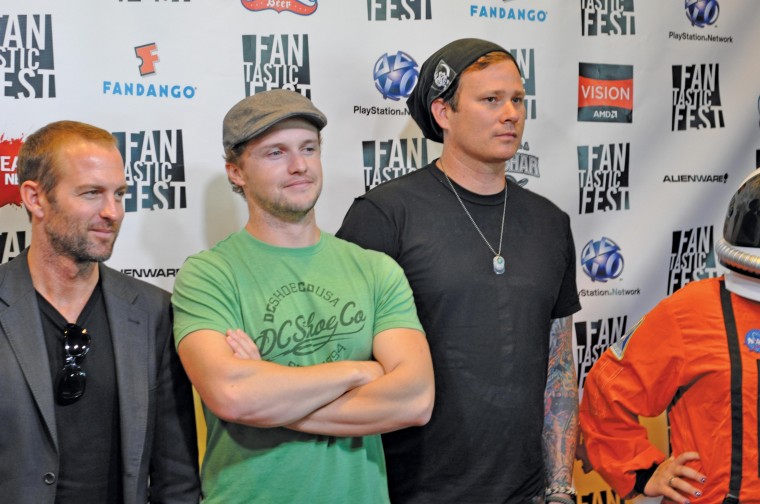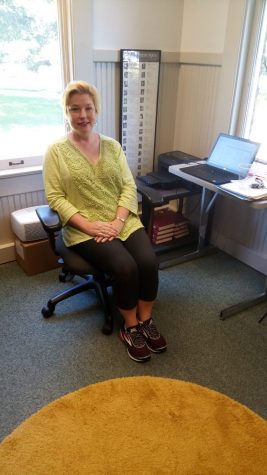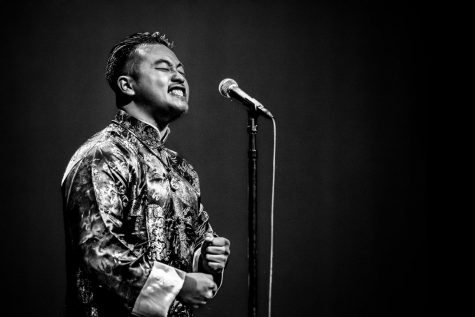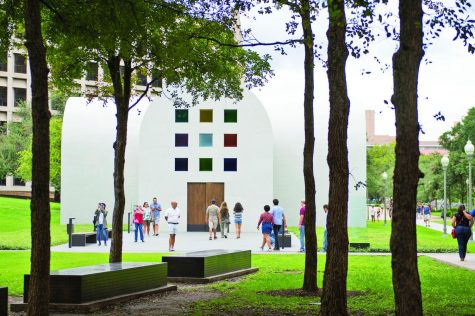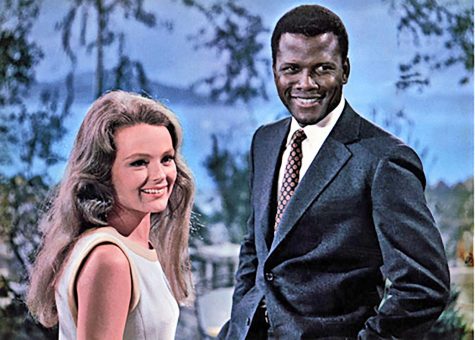Fantastic Fest Q&A: Tom DeLonge screens new film
Tom DeLonge is known for his role as guitarist and singer in the bands Blink 182 and Angles & Airwaves. Recently, he stretched his creative wings to produce and write the score for his new film “LOVE.”
Before the film screened at Fantastic Fest, DeLonge, director Will Eubank and actor Gunner Wright sat down with Hilltop Views to discuss the film and its message.
Hilltop Views: So first off, can you give me a brief description of “LOVE”?
Tom DeLonge: “LOVE” is an attempt to communicate a large theme of the human race on multiple mediums, one being music, an album and the other being film. They’re both interwoven with some of the ingredients of their own but also uniquely independent too. The film lives on its own accord. Its not by any means featuring the album, and the album isn’t featuring the movie, but they both work together in a partnership, I guess, to communicate a message of love and what that word means. Sometimes between a man and a woman and other times between a human being and another human being. And that’s the best I can describe. How’s that?
Will Eubank: A man and a woman or sometimes a human and another human being? That sounds weird. Is that your way of saying gay love?
TD: Well, I wasn’t really going to get into the homosexuality aspect, but I want to talk a little bit about that if you don’t mind. [laughs] I think there’s, one, a human connection and just overall consciousness is just a little bit different than falling in love with somebody and feeling connecting with them on an intimate level.
WE: Love is like the ultimate form of connection. Whether or not that stands for just sort of humanity in general and the good parts about it and sharing yourself with somebody else or talking to somebody else and therefore proving you exist even to yourself. But basically the movie is about an astronaut who goes to space and gets left there for seven years.
HV: What was the inspiration for the story?
TD: Well, Will, when we met and talked about going forward with this project, we as a band knew as a band knew that on the macro level what kind of themes we wanted. We wanted the movie to be very cerebral and meditative. We wanted it to be science fiction. We wanted it to be very philosophical with this approach and its message. We talked about directors like Kubrick, and we talked about bands like Pink Floyd, kind of trying to pick of the ball where they left off. That’s the macro template, but then Will had to come in and make that into a much more detailed picture.
WE: When I first met Tom, he sat me down. He was playing music from their second album, “I-Empire.” There was a song in their called “Love Like Rockets,” which was sort of finding a way to compare love to launching off in a rocket and going to space, and I just found that interesting. Then I was dwelling on that for a while, and I started thinking about what it would like to get left up in space for seven years. That’s where the movie sort of took off.
HV: Tom, you wrote the score for “LOVE” along with the rest of Angels & Airwaves and you produced the film. With all that you do, why did you want to get involved in “LOVE”?
TD: That’s a good question. I think because the movie industry was dying. I knew I needed to be overly ambitious and really figure out something worthwhile to get any attention at all for my new young band. The Internet’s full of noise, and I figure if you’re going to make a noise, make a loud one, but the only way to make a loud one is to do something extraordinarily risky where everyone will doubt you. I believe in myself, naïvely probably, but enough to where I feel like I’ll figure it out whatever it is I attempt to do. But I was also becoming a new person at the same time. Blink broke up so I was redefining who I was, and I wanted to be someone different than who I was. I wanted to be happy, and I wanted to say things that were worth listening to. That coupled with what I was talking about with starting a new band and the ambition, it was just like, “Let’s make a movie.” That was being naïve as well. What was I thinking? I had no idea. If I knew it was this hard, I wouldn’t have done it, but now I’m not scared of it though. Now we have a team of dudes. It’s like at the very minimum, we know we’ve got some really awesome dudes that we can work with again.
WE: We know where to start from.
TD: And what not to do again.
EW: That was probably the hardest part. The craziest thing that we’ve never even talked about was the first time we met, you were like, “So when can you start? We probably need to have this done by September.” Four years later.
TD: You know what’s even crazier than that? I was building a giant piece of technology to basically service this idea. It wasn’t even just the film. Everything in my life was revolving around what potentially could happen if all the pieces aligned. And that’s a whole other story, just trying to become a technologist just so I could service my film and rent it and sell it because I knew no one else would do it for me. It’s crazy. People probably would have done it back then but it took so long that everyone’s gone now. We have to do it ourselves. Thank God I have technology! It’s been a crazy road.
HV: Gunner, for the majority of the film your character has no human interaction. Did you find it difficult at all not being able to collaborate or directly play off other actors?
Gunner Wright: I started off doing a lot of commercial work where it’s usually just you and the camera guy, so I was a little more comfortable with that aspect of it, but discovering who this guy was and conveying those emotions and not necessarily being able to feed off of, especially with a woman in this example. We had a little bit of that to a degree, but Will was huge in the sense that we had tons of time to play, there was no time restraints. Two years into the project we were really starting to jell. I felt really comfortable with Will, and he would just literally almost feed me lines, and we would almost do the scene together and just play. And living up on his ranch and almost distancing myself from Hollywood for a long period of time really gave me that headspace to detach myself from emails, phone calls and all that to where I really got a little bit of solitude here by cattle and horses and chickens and frogs. I’m living in this trailer, and it’s not hard to find that headspace. So Will was a huge part of that, helping me get there. And then Tom’s music. The score is what it was. I never heard the score ‘til I actually saw the film with an audience, but his music is so cinematic, like he was saying with Will’s work, that sometimes I would just be by myself and the sun’s setting and I’m in the trailer, and I’d just listen to one of his songs, and I’d just go there. I’d feel whatever that emotion was, and I know that we’re going to have to go do this one scene, and it’d just help me transfer into that. I mean, music’s important to me. It helps me get into a emotion.
HV: Will, you built basically the entire set by hand in your parents driveway and backyard, but it looks completely legit. Have you had much experience building complex sets like the space station?
WE: I do now. It’s just a slow process. When he says we were two years into it, it’s primarily because during that two years, I was building one tunnel, then the next tunnel, then the next tunnel. I was just learning as I went along, but I learned, so that’s all that matters.
TD: He was a construction company now.
WE: It’s called Tom’s Tools.
HV: This is all of you guys’ first big experience – first lead real, big movie directing, first score, first time to produce a film. Do you think you’ll continue doing bigger things like this?
TD: Yeah, I think all of us had a taste of something that was a lot of fun and a great experience, not only just in learning but being able to do something that’s being valued as art. I think when you get a little taste of that as an artist, it makes your thirst unquenchable to do it again. But none of us really realize…Gunner goes off and works with Clint Eastwood. That’s fair enough, that’s a big step. OK, well we’re not quite there yet. He didn’t call me or anything. But I would be there if he did. I would have done that. [laughs]
GW: Well, I had Leo, you know. [laughs] No, but like Tom said, with the message of love and his scope of a message of what he wants to convey and with Will, it’s like coming back from Athens and knowing that that economy’s hurting, those people are hurting, but through this film, people walked away feeling good. Whatever their ideas are for another film, I know it’s going to have some kind of a deep message that is going to change someone. I want to be apart of that ‘til I don’t want to act anymore.
WE: Yeah, totally. Honestly, Tom and I are talking about another project that he has brewing in his brain that hopefully we’ll get to. We will get to no matter what.
TD: That’s going to be easy compared to this one. It’ll be bigger, but this one seemed insurmountable at times. If we did that, like hardknocks.
WE: It’ll be different.
TD: It’ll be different. It’ll be hard in some ways, but it’ll be fun.
WE: But I am looking forward to it. I’m excited to see the story. I’m excited just to see the stack of papers at first and then love it and then to be like, “Yes! Let’s make second.”


